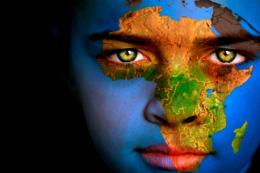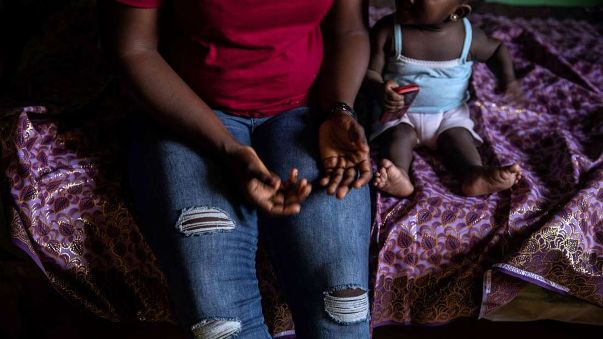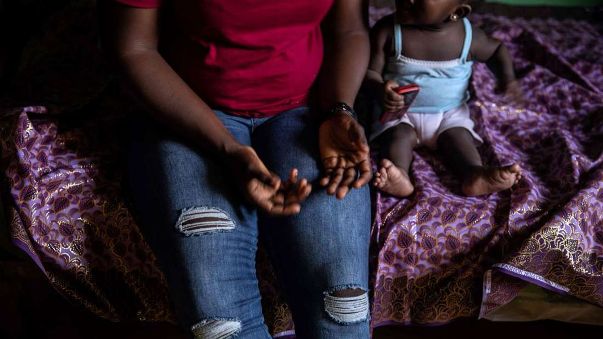|
|||||||||
|
By:
SHOLA LAWAL | |||||||||
| Posted:
Jul,28-2020 18:47:53
| |||||||||
The three young women agreed they would escape by nightfall. They didn't have any money or documents, but Jessica, 19, and her friends knew it was time to go. The brothel was not as crowded as usual: since the start of the coronavirus outbreak, the client base had fallen.
Together, they waited for night to settle and for the madam to retire to her room. Then, they sprinted for the highway that runs through Papara, a town in the far north of the Ivory Coast, close to the border with Mali.
Jessica and her friend, Favor, had been trafficked into prostitution about a month earlier. (Both women, as well as the other survivors of trafficking in this story, asked to have only their first names used for safety concerns.)
SEX IN BROTHELBack in February, a female friend to both girls' families in Nigeria had promised them jobs in a clothing factory in the Ivory Coast. Udochi, 20, had been trafficked in a similar manner earlier in the year. Upon arrival in Papara, all three women found themselves in a brothel, where the madam forced them to have sex with multiple men for a daily salary of $1.29 (Sh139). The women fled the brothel in March, but almost four months later they are still in the Ivory Coast; three out of hundreds of trafficked Nigerian women who anti-trafficking advocacy groups believe are stuck abroad during the Covid-19 pandemic, as border closures hamper repatriation efforts across the region. When the Nigerian government imposed a state of emergency lockdown in March, they paused international flights to curb the infection's spread and unwittingly left trafficking survivors stranded in dangerous locations far from home. Now these women are anxiously awaiting evacuation from across Africa and the Gulf, as authorities contend with towering logistical hurdles involved in organising safe flights and the virus continues to rage around the world.HAPPY ESCAPEJessica, Favor and Udochi are safe in a women's shelter in Daloa, a city in the west of the Ivory Coast, but they don't know when they'll get back home. "I'm happy I escaped that place," Jessica said, speaking by phone on a Saturday evening in June. "But we want to go back to Nigeria." Experts worldwide agree that the pandemic is having a disproportionate impact on trafficking survivors. A forthcoming OSCE Office for Democratic Institutions (ODHIR) and Human Rights and UN Women survey reveals that almost 70 per cent of trafficking survivors from 35 countries say Covid-19 has negatively affected their financial wellbeing, while more than two-thirds say their mental health is suffering as government-imposed lockdowns trigger memories of the last time their freedoms were taken away.
PROMISES OF JOBSOf the 20,500 Nigerian migrants helped by the IOM since 2017, some 90 per cent needed to be brought home from Libya and 76 per cent had experienced exploitation. Nigeria's National Agency for the Prohibition of Trafficking in Persons (Naptip) identified 20,000 trafficked Nigerian women inMali in 2019alone. The Nigerian embassy in Ivory Coastrepatriates 20women monthly, Mohammed Abdulkadir Maccido, the Charge d'Affaires told Nigeria's Punch Newwspaper last year. According to the IOM, most trafficking survivors they work with in Nigeria, are women aged around 21 years. They're often lured with promises of jobs in other African countries, or in Europe or Asia; countries often seen as a welcome escape fromrising unemployment in Nigeria. Once the women reach their destination, traffickers hand them off to "madams", female ring leaders, often victims of trafficking themselves. The madams force the women into prostitution and domestic work to pay back the "debts" they've incurred for food, transport and accommodation since leaving their homes --typically thousands of dollars that can take years of forced labour to repay.LEGAL MOVEMENTDuring Covid-19, the number of women trafficked from Nigeria continues to grow--even as local governments curtail legal movement. When awareness of the coronavirus began to spread in March, authorities in Nigeria and the Ivory Coast swung into action early, fearing an outbreak could decimate their health care systems. By the end of the month, both countries had closed their land and air borders. But despite the restrictions, international law enforcement agents and anti-trafficking organizations say trafficking networks remain active in the region, as traffickers bribe their way across borders to move freely. The Nigerian government began lifting domestic travel restrictions earlier this month, but there is no confirmation yet of when external borders may open again. Nigeria, one of the worst hit countries on the continent, had reported more than34,000 cases and more than 700 deathsby July 16.FORCED LABOURMeanwhile, lockdowns are limiting repatriation efforts and leaving trafficking survivors stranded. According to the OSCE ODIHR and UN Women survey, at least a third of anti-trafficking organizations worldwide are struggling to repatriate survivors during the crisis. In 2018 and 2019, the IOM worked with the Nigerian government to repatriate upwards of 7,000 survivors of exploitation each year--men and women who had experienced forced labour and prostitution. Since the start of this year, they've only succeeded in repatriating 620 individuals. "It's a drastic drop," says Franz Celestin, IOM chief of mission for Nigeria. "The longer we wait, the more they'll be exploited and the longer the pain and suffering will last." Motilola Adekunle, co-founder of Project Ferry, a Nigerian NGO working with trafficked survivors and helping Jessica and Favor, agrees that the coronavirus is hampering efforts to support exploited women. "This pandemic has literally put a halt to our work because people cannot move around and that's an issue," Adekunle says. Work that previously took days, she adds, now takes months, as systems put in place by non-profits and governments to repatriate and support trafficking survivors have been turned upside down.REPATRIATION FLIGHTS"The Nigerian government has organized so many flights that now they don't have any space," says Celestin, of IOM. "It's very difficult." He says IOM is currently working to find funding to shelter 180 migrants--the majority of whom are survivors of exploitation awaiting repatriation from Niger. Until IOM can work out where to house them, they must remain in Niamey and Agadez, far from their families and unsure of when they'll be able to get home. Celestin hopes to have them back in Nigeria by the end of this month. Since March, repatriation flights have been allowed into Nigeria's Abuja and Lagos airports, but a 14-day quarantine is imposed upon arrival and problems have arisen regarding where survivors should stay in the days following their return. Even in ordinary times, the process of recovery following repatriation can be complicated. Non-profit staff will wait at airports across Nigeria to bring trafficking survivors to previously-identified "safe spaces"--a women's shelter, or a hotel.COUNSELLINGCounselling and psycho-social support follows in the form of daily or weekly sessions, while local non-profit organizations often team up to ensure the women can find employment nearby, and that they won’t fall victim to "re-trafficking" back over the border. But during the pandemic, the risk of spreading Covid-19 means staying in shelters is no longer an option. To help the women reintegrate, organizations have begun rolling out counselling sessions and skills training online, but not everyone has access to the Internet. "We've tried to help some women with getting online during the pandemic," says R Evon Benson-Idahosa, founder ofPathfinders Justice Initiative, a local anti-trafficking initiative that's helping trafficking survivors set up their own businesses. "But many of them just do not have the capacity to switch."DOMESTIC SERVITUDEOutside of the African continent, hundreds of Nigerian women also say they're stranded after experiencing trafficking and exploitation. An estimated 5,000 to 10,000 Nigerian women are trapped in forced domestic servitude in the Middle East. Naptip has received more than 650 reports of trafficked Nigerian women in Lebanon and Oman in 2020 alone. Toluwalase, 30, has been trying to get back to her home in Nigeria since June. When the single mother-of-three boarded a plane from Abuja, Nigeria's capital, nearly two years ago, she was aware she would be a domestic helper in Oman with a $200 (Sh21,560) monthly salary. What she didn't know was that her employers would force her to work from dawn to midnight with little sleep, that they would confiscate her passport and delay her salary, and that her boss would sexually assault her. "I was not told it's this terrible," Toluwalase said over WhatsApp. She would not have agreed to work in Oman if she had known about the abuse of migrant workers like her, she says.SPEAK ARABICPart of the problem is the Kafala System--which transfers control of immigration and employment status of migrant workers to individual employers--in countries including Lebanon and Oman. That means reporting abuses to local authorities is rarely an option; legally, a migrant worker cannot leave the country without his or her employer's permission, even if they're experiencing abuse. Many migrant workers from Nigeria do not speak Arabic, which also limits their ability to seek help. Pre-Covid-19, women who were exploited by their employers overseas could contact local human rights advocacy groups, who would then notify Nigerian officials to arrange their journey home. But lockdowns have put a pause to activists' work, and the migrant workers have found themselves stuck.NO TIMELINEJulie Okah-Donli, Naptip's director, says the agency is working with Nigerian embassies across the Gulf and Middle East to evacuate exploited migrant workers and sex trafficking survivors. But because of movement restrictions, the agency can no longer reach stranded women in Europe and Asia. Without intervention, violence and abuse go unchecked, "I can imagine the numbers that have died, unreported during this pandemic," she says. There is no official timeline for bringing trafficked persons back home to Nigeria, confirms a spokesperson for the Nigerian ministry of foreign affairs. There are signs to suggest progress is being made, albeit only in certain regions.UNDER THE RADARIn May, the IOM and the Nigerian government repatriated 99 Nigerians who were being exploited in Lebanon--49 of whom were survivors of labour and sex trafficking. Bringing back so many Nigerians from the region in one go is unprecedented; usually the IOM would receive word of two or three trafficking cases in Lebanon every month. "We're seeing a much more organized approach from the government in dealing with this," said Celestin. "Usually with victims of trafficking, it's all under the radar. Maybe it’s because of the spotlight that's on this, but we are seeing a concerted effort." The repatriations from Lebanon were possible because the Lebanese government supported Nigeria logistically and financially, saidGeoffrey Onyeama, Nigeria's minister of foreign affairs.STEP IN SOONSimilar efforts have yet to be seen elsewhere. For Jessica and her friends in the Ivory Coast, the longer repatriation takes, the longer they are at risk of re-trafficking and violence. Although in a "safe house," the threat remains that their traffickers will track them down and force them back into prostitution. All the women can do, they say, is hope that the Nigerian government will step in soon. This story was first published inTIMEin partnership with The Fuller Project, a global nonprofit newsroom reporting on issues that impact women. | |||||||||
|
Source:
Daily Nation
| |||||||||
|
||||||||||||||||||||||||||||||||||||||||||||||||||||||||||||||||||||||||||||||||||||||||||||||||||||||||||||||
|
||||||||||||||||||||||||||||||||||||||||||||||||||||||||||||||||||||||||||||||||||||||||||||||||||||||||||||||


.jpg)





